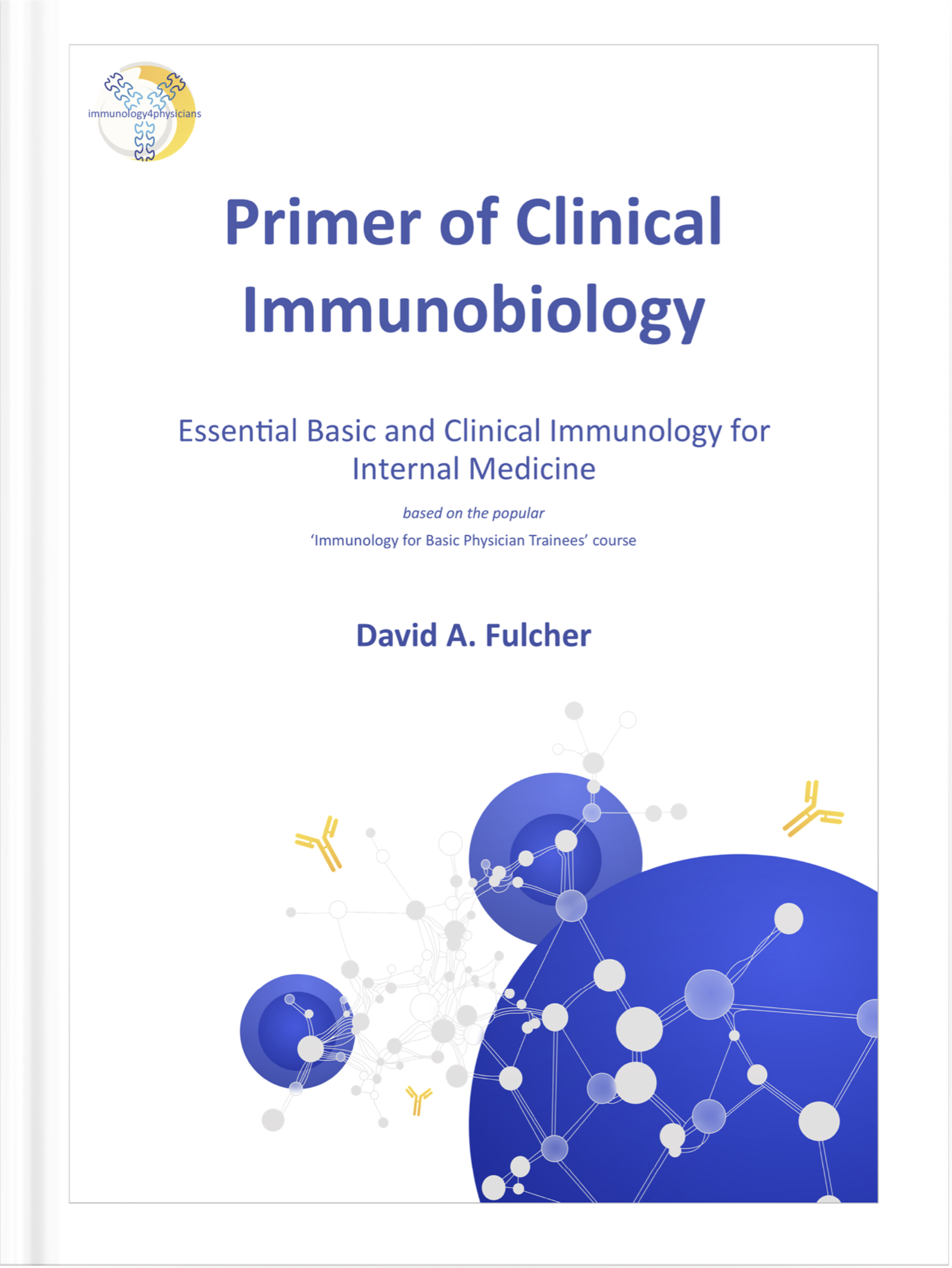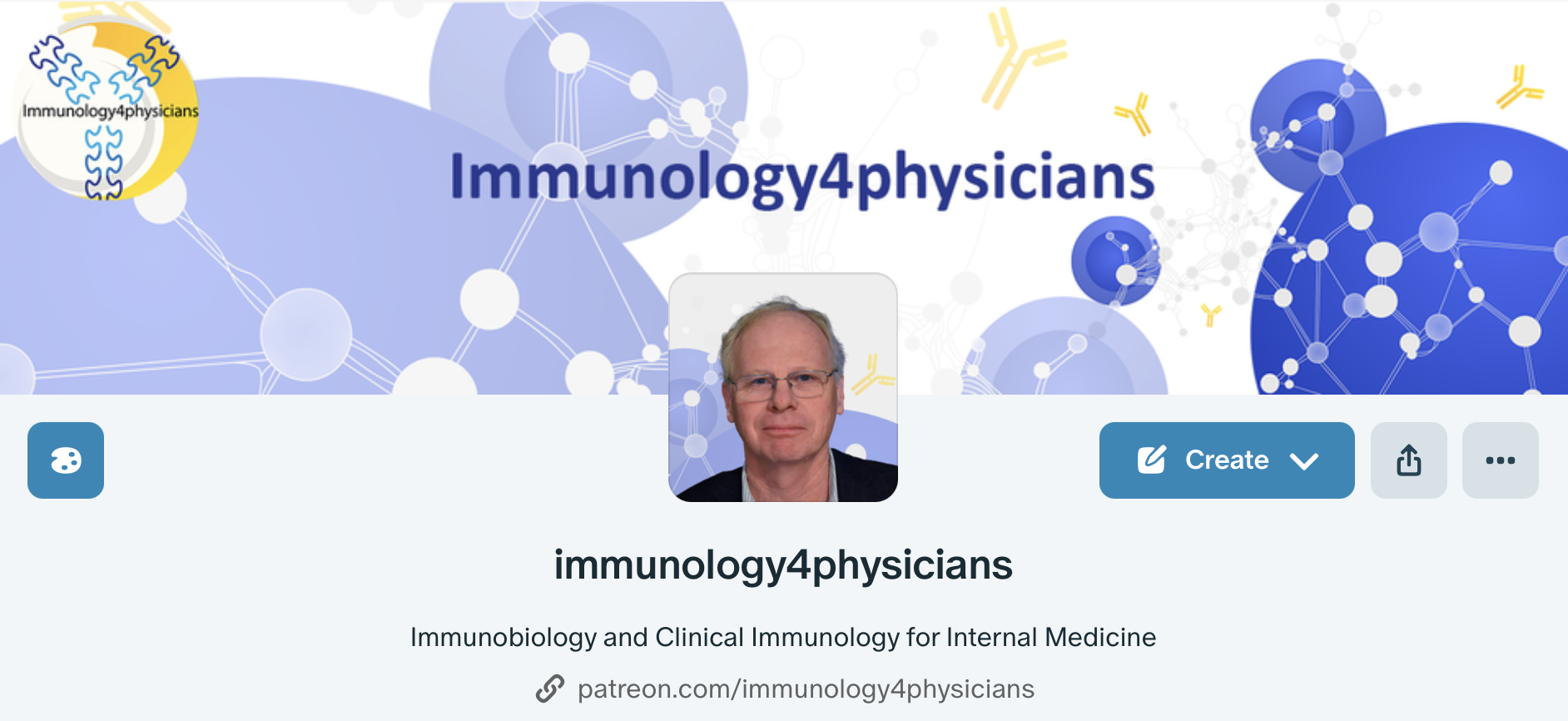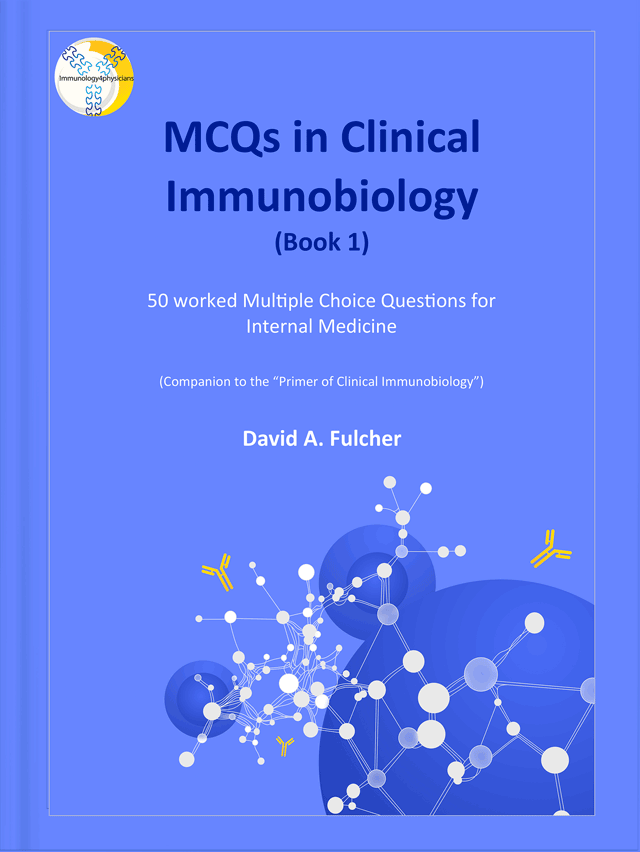Use the following link:
The companion book follows the lecture series closely, one chapter per lecture:

The immunology4bpts course aims to provide essential knowledge about the basic science of the immune system, and how this translates into clinical medicine. Thus the requirements for both the Basic Sciences as well as Clinical Medicine will be covered.
This course is designed for
All lectures are accessed by Video-on-demand. You can start the lecture series anytime on a rental basis via Vimeo and you will have 30-days to complete it.
Get hold of the 'Primer of Clinical Immunobiology', which serves as the course manual (see below).
The Primer has been written specifically to support the immunology4bpts course! Listen to the lectures and follow in the book, making e-notes as needed. The ePub is readingly available from the Amazon kindle bookstore.
This is a book about immunology written by a doctor, for doctors. It provides the essential elements of the workings of the immune system that doctors need, particularly those with an interest in internal medicine.
A firm grasp of the immune system is important for all physicians, not only to understand the pathogenesis of many conditions, or to recognise and diagnose common immune conditions, but also to understand new therapeutics like monoclonals, checkpoint inhibitors, cytokine or Jak inhibitors etc., all of which are becoming increasingly used in clinical practice. This book will help the reader get on top of all this information and prepare them for imminent advances in this field.
The Primer not only teaches the fundamental biology of the immune system, but the relevance of each immunological concept for clinical medicine. This is what is meant by 'Clinical Immunobiology'.
The book does not get bogged down with the minutiae of immunology, but rather concentrates on the fundamentals of Immunobiology as they apply to human disease, the essentials that will be relevant to patients seen every day in practice.
The concepts are presented in an easy-going readable style, illustrated by over 350 bespoke graphics. Each chapter builds on the previous one, and when enough of the basic concepts have been explained, the importance of the immunobiology is illustrated by the exposition of specific medical disorders in detail, including clinical presentation, diagnosis and management, particularly concentrating on immunodeficiency disorders as well as allergic disease.
To read this book, it certainly helps to have a medical background, but even if you are a science undergraduate with one eye on medicine or medical research, there is enough basic biology presented to give a solid grounding in immunobiology as well as sparking your interest in the application of the science of immunology! But if your interest is in internal medicine and you need to get on top of the basic immunological concepts required to learn and practise medicine, this book is for you!
The book draws on the last 20 years of the immunology4bpts courses and is the foundation text for this and future iterations.
The Print edition of the Primer of Clinical Immunobiology is available from amazon.com:
The eBook of the Primer of Clinical Immunobiology is available on Apple Books and Kindle:

The Patreon site is all about consolidation of learning in 'Clinical Immunobiology', reinforcing knowledge of basic immunobiology with an emphasis on how it helps an understanding of disorders across the spectrum of specialist internal medicine, particularly clinical immunology. Here you will find short lectures, MCQs, revision exercises and various snippets to help reinforce your knowledge of Immunology. It draws heavily on material from the Primer and Video lecture.
The site is free to join, and let's you access a few learning activities to give you an idea. To unlock access to the entire site of over 100 learning activities costs AUD $9.90/month.
To have a look, follow this link:

This is available for those who want a written copy of the 50 Multiple Choice Questons in the immunology4bpts 2025 course. It includes all the worked answers, one question per page, with cross-references to the Primer and replete with all the usual graphics.
MCQs in Clinical Immunobiology eBook is available NOW from Apple Books and Kindle:

Vimeo lecture series: $AUD 325.00 (incl. GST)
(Access to Revision exercises via Patreon: AUD $9.90 per month)
Clinical Immunobiology video lecture seriesAUD $39.99
Primer of Clinical ImmunobiologyThe course is designed to cover a wide scope of basic and applied immunology. Here's what we'll be covering!
Basic Science
Clinical Applications

Prof David A. Fulcher
MBBS, PhD, FRACP, FRCPA
Basic Science

Prof David A. Fulcher
MBBS, PhD, FRACP, FRCPA
Clinical Applications

Prof David A. Fulcher
MBBS, PhD, FRACP, FRCPA
Basic Science
Clinical Applications

Prof David A. Fulcher
MBBS, PhD, FRACP, FRCPA
Basic Science
Clinical Applications

Prof David A. Fulcher
MBBS, PhD, FRACP, FRCPA
Basic Science
Clinical Applications

Prof David A. Fulcher
MBBS, PhD, FRACP, FRCPA
Basic Science

Prof David A. Fulcher
MBBS, PhD, FRACP, FRCPA
Clinical Applications

Prof David A. Fulcher
MBBS, PhD, FRACP, FRCPA
Basic Science
Clinical Applications

Prof David A. Fulcher
MBBS, PhD, FRACP, FRCPA
Clinical Applications

Prof David A. Fulcher
MBBS, PhD, FRACP, FRCPA
Basic Science
Clinical Applications

Prof David A. Fulcher
MBBS, PhD, FRACP, FRCPA
Basic Science
Clinical Applications

Prof David A. Fulcher
MBBS, PhD, FRACP, FRCPA
Basic Science

Prof David A. Fulcher
MBBS, PhD, FRACP, FRCPA
Basic Science

Prof David A. Fulcher
MBBS, PhD, FRACP, FRCPA
Basic Science
Clinical Applications

Prof David A. Fulcher
MBBS, PhD, FRACP, FRCPA
Basic Science
Clinical Applications

Prof David A. Fulcher
MBBS, PhD, FRACP, FRCPA
Basic Science
Clinical Applications

Prof David A. Fulcher
MBBS, PhD, FRACP, FRCPA
Basic Science
Clinical Applications

Prof David A. Fulcher
MBBS, PhD, FRACP, FRCPA
Basic Science
Clinical Applications

Prof David A. Fulcher
MBBS, PhD, FRACP, FRCPA
Clinical Applications

A/Prof Ming-Wei Lin
MBBS, FRACP, FRCPA
Clinical Applications

A/Prof Ming-Wei Lin
MBBS, FRACP, FRCPA
Basic Science
Clinical Applications

Prof David A. Fulcher
MBBS, PhD, FRACP, FRCPA
Basic Science
Clinical Applications

Prof David A. Fulcher
MBBS, PhD, FRACP, FRCPA
Clinical Applications

Heather Dunckley
BSc Hons, PhD, A(ACHI)
Basic Science
Clinical Applications

Prof David A. Fulcher
MBBS, PhD, FRACP, FRCPA
Clinical Applications

A/Prof Ming-Wei Lin
MBBS, FRACP, FRCPA
Basic Science

Prof David A. Fulcher
MBBS, PhD, FRACP, FRCPA
Clinical Applications
Time to go through 50 MCQs to see how much you've learnt!

Prof David A. Fulcher
MBBS, PhD, FRACP, FRCPA
Answers and explanation of the 50 MCQs in trial examination.

Prof David A. Fulcher
MBBS, PhD, FRACP, FRCPA
Slides are packed with detailed illustrations to reinforce critical immunological concepts
All our speakers have extensive experience and passion for Immunology, and are keen to share their knowledge

Dr Fulcher is currently immunopathologist at 4Cyte Pathology and was a practising Clinical Immunologist for over 30 years. He was Professor (2016-2021), then Honorary Professor (2021-2025), at Australian National University, where he rejuvenated the 'Advanced and Applied Immunology' course which he convened for five years (2016-2021). He has a national reputation for teaching immunology at all levels, including undergraduate, basic physician trainee and post-graduate stages. He has held every major national teaching position in Immunology and Immunopathology, including Co-ordinator of Advanced Training in Immunology, Chair of the Joint Specialist Advisory Committee in Immunology (RACP), and Chief Examiner in Immunopathology (RCPA). He was Director of Physician Training and then Network Director of Physician Training. He has convened Immunology4bpts since 2006.

A/Prof Ming-Wei Lin is a senior staff specialist in the Department of Clinical Immunology and Head of Immunopathology at ICPMR, Westmead Hospital. She co-directs the multidisciplinary Immunobullous clinic and has special interests in autoimmune disease and immunodeficiency.

Dr Dunckley is the ASHI Director and Clinical Scientist of the New Zealand Transplantation and Immunogenetics Laboratory, New Zealand Blood Service. She has extensive practical laboratory experience in the field of histocompatibility testing for solid organ and haematopoietic cell transplantation. She has served on the Board of the American Society for Histocompatibility and Immunogenetics (ASHI) and is a Past-President of the Asia Pacific Histocompatibility and Immunogenetics Association (APHIA). She regularly teaches on the theory and application of human leucocyte antigen (HLA) typing for transplantation and for HLA linked immunological diseases.

A/Prof Cole is a Paediatric Immunologist, specialising in stem cell transplant for primary immunodeficiency at Royal Children’s Hospital, Melbourne. She is current chair of the Australasian Society of Clinical Immunology and Allergy (ASCIA) primary immunodeficiency committee, chair of the ASCIA immunoglobulin replacement therapy working party and facilitator of the Transplantation in Primary Immunodeficiency (TAPID) group. Her primary research interests are in better understanding mechanisms underlying immune deficiency and improving stem cell transplant outcomes for primary immunodeficiency.
Very good introduction to immunology for those of us who have very little knowledge of it. Takes you right the way through the basics to the clinical applications.
This course is simply excellent. Most of the concepts were new to me, but they were presented in a way that was so easy to digest. I also found the course very enjoyable! I would 100% recommend this course.
I thought the lectures were fantastic - really great breakdown of the important components of basic immunology, that we're really nicely intertwined with clinical immunology. I definitely feel more confident with my immunology knowledge than prior to sitting the course.
This is an absolutely brilliant 2-day course on Immunology. So thorough, so much detail, and so well explained from the foundations upwards. I really enjoyed the reflection time and MCQs at the end of each section, giving us the chance to assess what we have learnt and how we can apply our understanding. The exam-style MCQs are perfect for this. The visual aids, schematics, graphs and diagrams are awesome. I also like the addition of videos to explain the biology in a slightly different way. Finally, Dr Fulcher's passion for the subject is palpable and infectious.
I felt like I was learning rather than simply being fed a list of facts.
Excellent thorough summary of a lot of key immunology concepts. Really enjoyed the online lecture format - very well done.